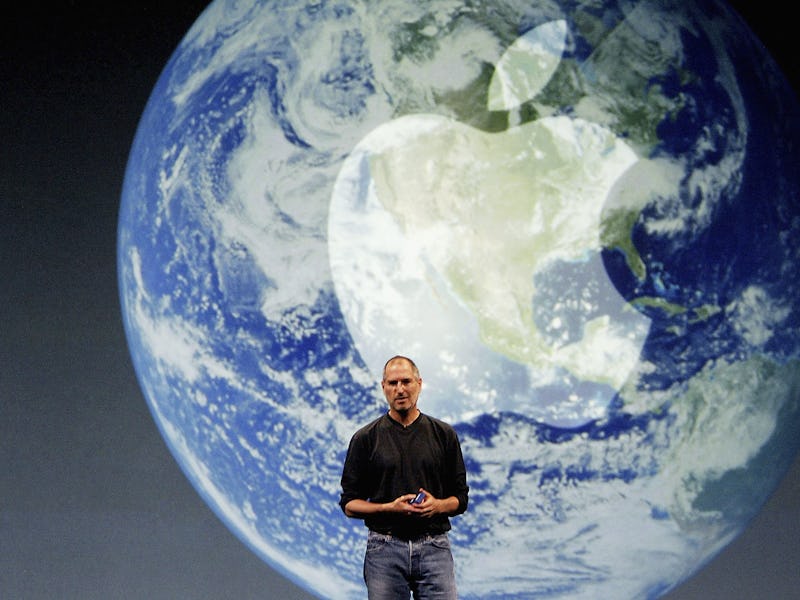Author of Steve Jobs Paper: 'Bernie Sanders Is Rising in the Polls, but People Are Flocking to the Steve Jobs Movie'
Steve Jobs is a symbol of "Good Capitalism" argues sociology professor Thomas Streeter.

Is America obsessed with Steve Jobs because of who he was as a person, or because he fits so well into our narrative of American success?
In his new paper, published in the International Journal of Communication, University of Vermont sociology Professor Thomas Streeter argues that it is because of the seduction of Jobs’ classic tale of an underdog thriving in business that we have paid for two Steve Jobs biopics in the past two years and have given little to no attention to inventors like Dennis Ritchie and Douglas Engelbart.
As the new Steve Jobs film builds acclaim and ticket sales, Streeter spoke with Inverse about Jobs as a cultural symbol and how he has more in common with poets than computer scientists.
Jobs alongside an image of Michael Fassbender, who plays him in the recent film "Steve Jobs."
In your paper you argue that society’s adoration of and interest in Steve Jobs stems more from our love of him as a meme, rather than a man. When we think of Steve Jobs as a concept instead of a person, what do you think people are imagining?
The most popular stories usually offer different people different things to relate to. Some people probably just relate to bits of Jobs’ personal life, like seeking spiritual clarity in college, or the emphasis on following your own passion rather than the well-trodden path. Others may remember the various Apple gadgets they’ve owned over the years, which bring back other memories for them. But I think most of all people are attracted to the idea [Job’s belief] that technologies, success, and work life involve passion, emotion, and personal vision — i.e., romantic rather than purely rational concerns.
Do you believe thinking of Jobs within this construct can be negative for society?
I do not think it’s wrong for people to imagine a life where their inner feelings and their outer behaviors are integrated, where making a living does not involve putting one’s feelings on hold. But I worry that some use the story of Steve Jobs to reinforce the idea that what gives us new technologies is the brilliance of a handful of corporate executives, that we don’t need to worry about, say, public education or other social initiatives because it all comes from a few brilliant leaders. Technologies come from contexts with good social services, good educational systems, and good support for all kinds of individuals. The internet — the “i” in iPhone — was born in government-financed research. Let’s not forget that.
Jobs on the cover UnixWorld in April 1993.
Is it the personal nature of the Apple brand that has kept society of thinking of it positively, versus the “corporate greed” persona that is attached to similarly wealthy enterprises? How much of that brand, in your opinion, is because of Jobs?
It was in the 1970s that people started using the term “personal computer” to soften the harsh, rationalist image of computers that dominated at the time. The idea that computers need not be giant machines for doing math and sorting, that they could be used for personal expression, did indeed set loose a lot of creativity. Apple gradually seized on that idea, particularly with the Macintosh, and then when Jobs returned to Apple in the 1990s, he helped reinvigorate the notion as connected to Apple. Because Apple makes things you can hold in your hand, it seems like an example of “good” capitalism, as if it’s different from say those firms that brought us mortgage-backed derivatives.
You write that Jobs has more in common with Ralph Waldo Emerson than Thomas Edison. How does the tech movement of the early 1990s connect to the romanticism of 19th century poets?
Romanticism arose in reaction to the enlightenment’s over-optimism about science, reason, and predictability. The idea was that there are crucial aspects of life that cannot be locked into a predictable, rigid grid. Since the early 19th century, I think romantic ways of understanding have persisted in the culture at large, bubbling up at odd intervals repeatedly. One important case of those ideas surfacing with impact was the 1960s counterculture. The counterculture then entered Silicon Valley in the 1970s and that’s where Jobs and many around him soaked up their own versions of romanticism as applied to computers.
Mourners leave tributes to Jobs outside of an Apple Store in New York City.
Do you think that with today’s tech boom and the increasing trend of these leaders involving themselves in social causes, that we are entering an era similar to the days when industrial tycoons, like Ford and Rockefeller, were the biggest celebrities?
American society has had a love/hate relationship with giant corporations since they first emerged in the progressive era. Right now, American feelings about how to best handle economic questions are deeply uncertain. Since 2008, Wall Street has gained many enemies on both the right and the left. So we’re hearing a lot from both sides. Bernie Sanders is rising in the polls, but people are flocking to the Steve Jobs movie. I’m interested to see how it all plays out.
This interview has been edited and condensed.